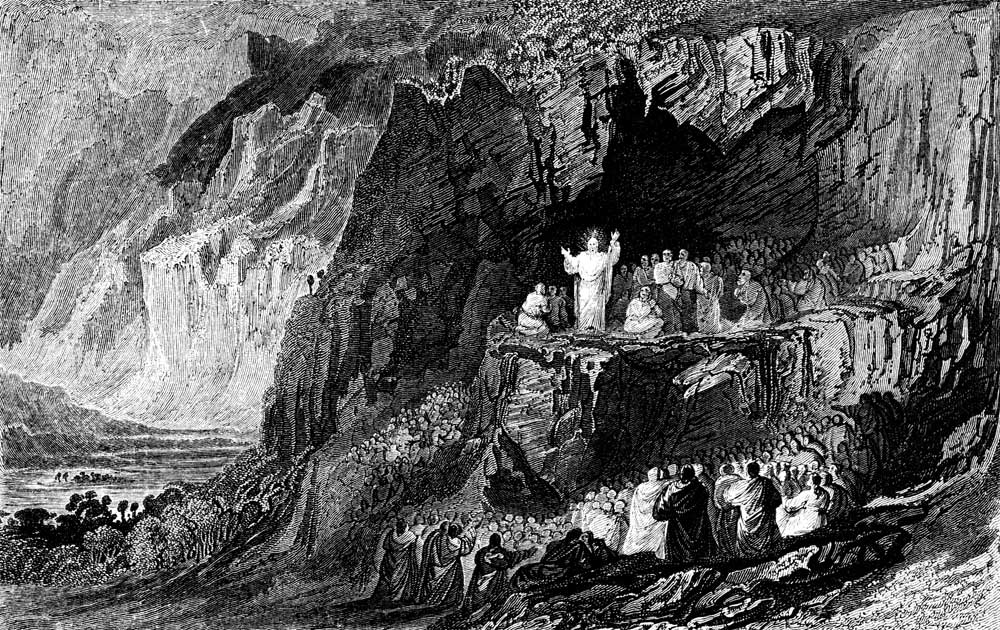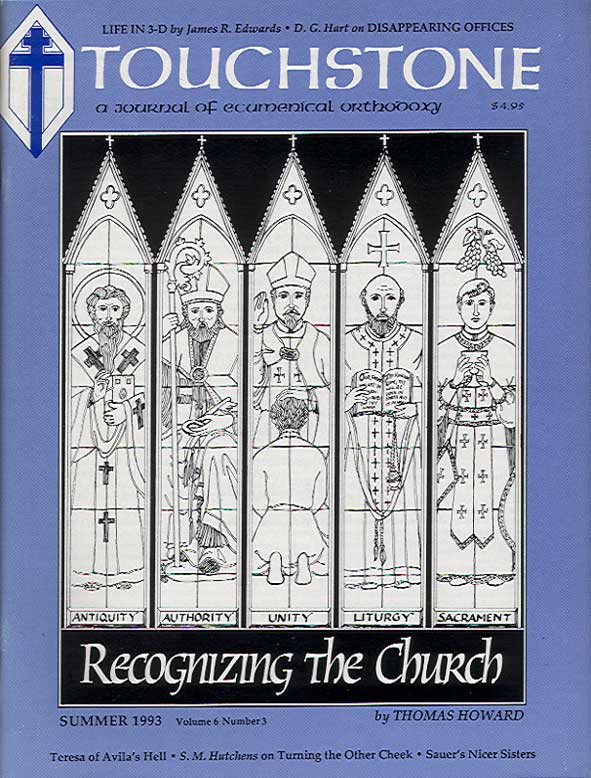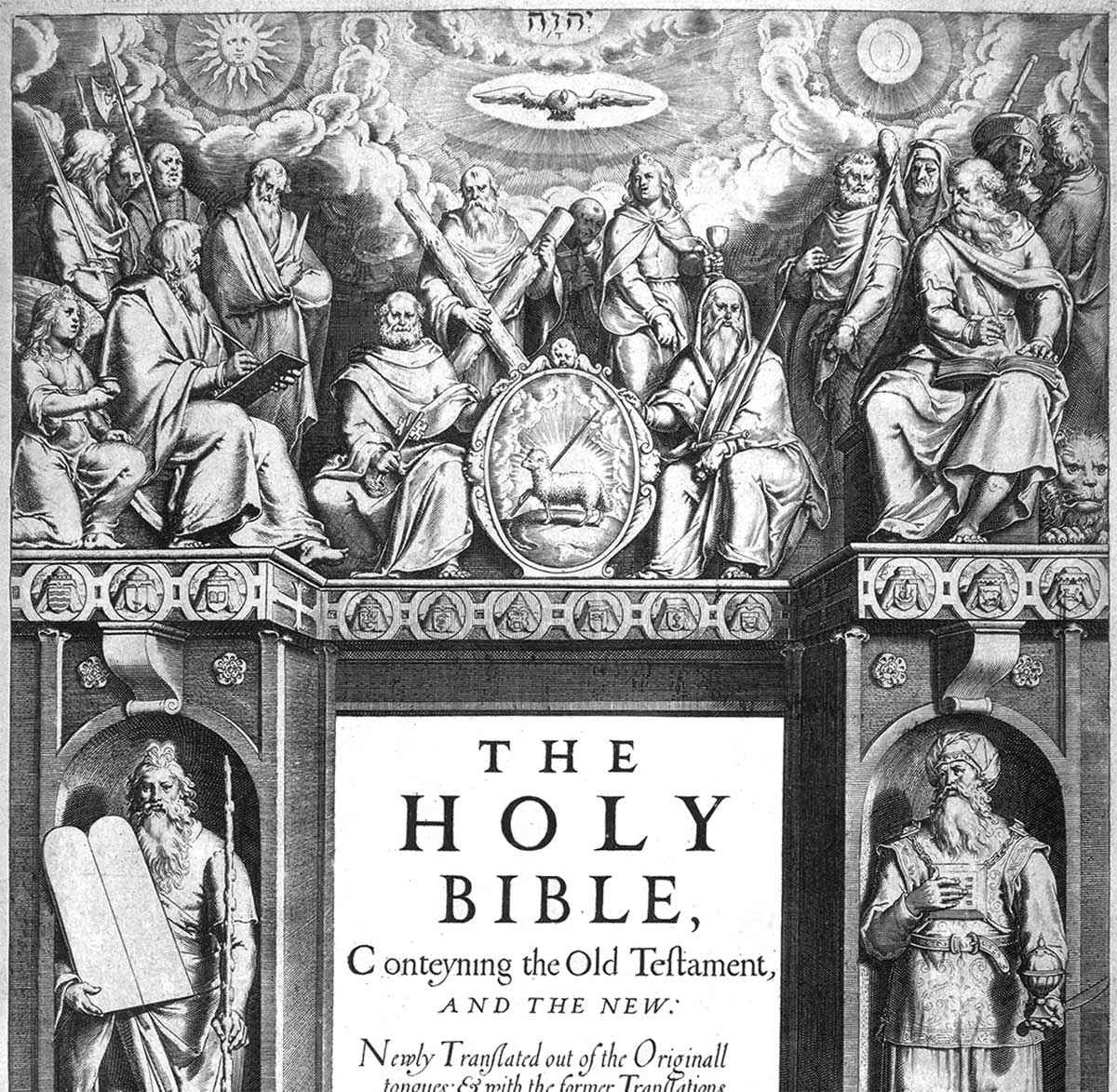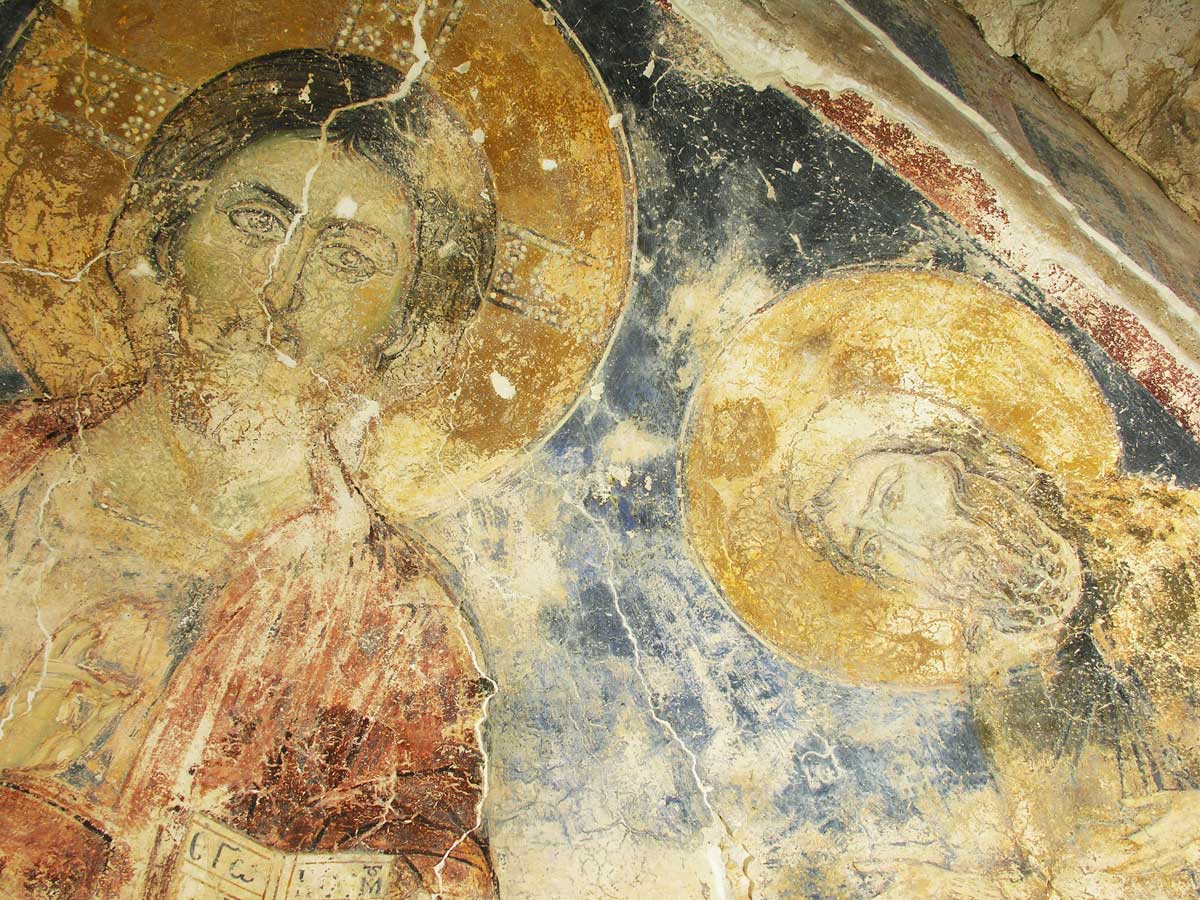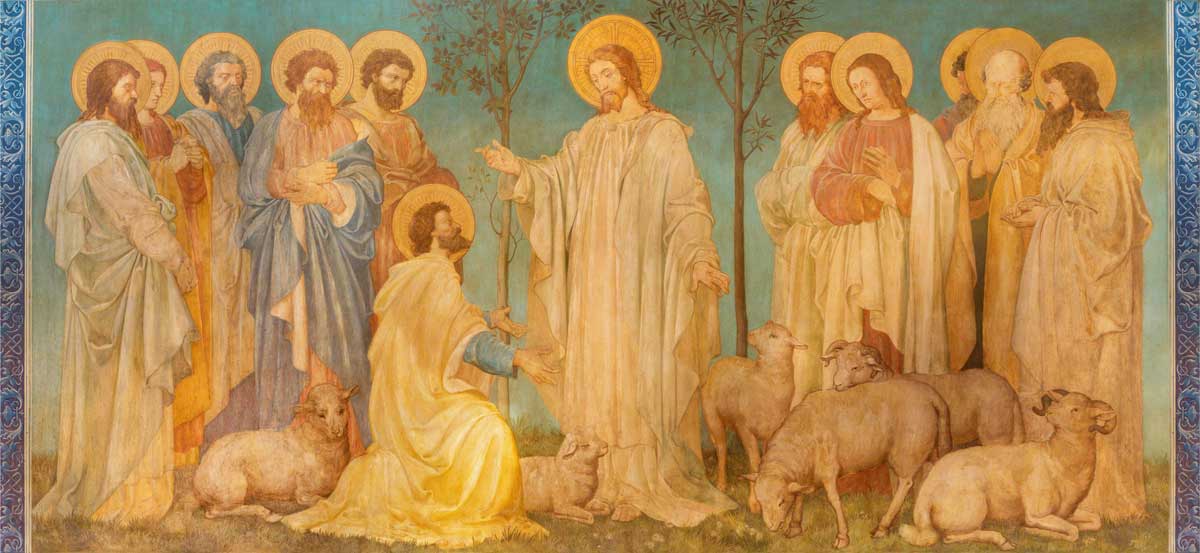On Turning the Cheek & Giving the Cloak
by S. M. Hutchens
Compare the following readings, the first from the Sermon on the Mount in the fifth chapter of Matthew, the second an account of our Lord’s confrontation with the pious citizens of Nazareth in the fourth chapter of Luke:
You have heard that it was said, “An eye for an eye and a tooth for a tooth.” But I say to you, do not resist one who is evil: If anyone strikes you on the right cheek, turn the other to him also. And if anyone would sue you and take your coat, let him have your cloak as well. And if anyone forces you to go one mile with him, go two. Give to him who begs from you, and do not refuse him who would borrow from you . . . . Love your enemies, for if you love only those who love you, what merit is that? . . . Be perfect, as your heavenly Father is perfect. (Matt. 5:38-42, 46, 48)
Jesus came to Nazareth, where he was brought up; and he went to the synagogue on the Sabbath day, as was his custom. . . . And he said, “No prophet is accepted by his own people. . . . There were many lepers in Israel during Elisha’s time, but the only one healed was Naaman—a Syrian.” The people in the synagogue were enraged when they heard this. They took him out to the brow of the hill upon which their city was built so they could throw him down. But he passed through the crowd, and went his way. (Luke 4:16, 24, 27-30)
Do our Lord’s actions in Nazareth measure up to the daunting moral canon he laid down in the Sermon on the Mount?
Examples of this sort could be multiplied; this is not the only time the Lord resisted people (or spirits) of evil intent. What are we to make of it? Did he fail to live up to his own principles? Did his ethics become more rigorous somewhere along the way? Did he lay down a law that even he could not reasonably expect to keep? These are opinions one can read in certain kinds of books. But how should Christians see it?
The most common mistake made by earnest believers in interpreting the Sermon on the Mount is the failure to take our Lord’s own life and ministry as the authoritative commentary on what it means and how it is to be put into practice. I chuckle when I think of all the preachers I have heard trying to help us squirm out from under what we find here. It is ironic while they are trying to relieve us of the burden of taking these admonitions literally, the only thing that keeps us from being put into hell this very minute is that God himself takes them exactly as they read.
Things become clearer if we can manage to stop thinking of the commands to turn the other cheek, and so forth, in fear of the advantage bad or pathologically dependent people would take of us if we did, and instead place ourselves where we belong in the scenario. We, you see, are the enemies, from whom he could extract eyes, teeth and everything else, and yet doesn’t. We are the ones who have demanded his coat, and received his cloak a well. We are the ones who beg from him, and who are not refused; we are the ones who ask him to go a mile with us, and then find (frequently to our annoyance) that he has decided to accompany us two. If we would be like him, we must do the same for others.
Those who attempt to divert this ethic to a future kingdom age, when it would be less ruinous to those who try it, have got it exactly wrong, for it was meant for times in which men are still at enmity with God and each other. This is what everyday charity looks like in the face of sin, not what it shall look like when evil is subdued. No, we cannot get out from under the Sermon on the Mount—unless we wish to wriggle out from under the mercies of God. We can only seek to understand it better and enter it with more of our faculties engaged. If we are afraid that being like God will kill us, we are right, it will. That is exactly what we who profess to follow Jesus have been promised. What we seek in understanding the Sermon on the Mount is not exemption from death, but greater skill in dying.
The real problem is not in the dying itself—we shall all do that; in fact, we are doing it right now—but that we must die as well and intelligently as we can, with all our faculties engaged. And more than that: As we go down into the waters, we must drag as many with us as we can, for we are not only in the business of dying ourselves, but of killing others. This is part of the symbolism of baptism, in which one Christian reaches up and pulls another down into the waters under which he is already disappearing.
There is a sense in which Tacitus was right when he said that Christians were the enemies of the human race (if this is indeed how the famous passage from the Annals is to be translated), for, being the friends of the race as it shall be, we are the enemies of the race as it is. Tacitus was a narrow man, and he thought of perfected humanity in terms of an old Roman ideal that was nearly gone by his time. He was right in holding to the concept of an ideal man. But he did not see that the only ones who could restore the good he loved were those who not only hated, as he did, what humanity had become, but who also were doing all they could to kill it in a Christian way, using their own bodies as torches to illuminate the Empire—as if what Christ had said about not resisting evil were taken literally.
On the other hand, the Fathers have few good words for those who seek a martyrdom that is not also seeking them. There are people who, when taken to the pinnacle of the temple, told to have faith and cast themselves down, do it. When I say that in dying our faculties must be engaged, what I really mean is that they must be attuned to the will of God as to how we should die. It is to be done, but not prematurely, and it is to be done in the manner prescribed. Let us give the benefit of the doubt to those who raise cautions about Matthew 5. We hope they do not mean to say that Christians should never live by these words, but that they are not to assume that they can live by them unintelligently and without help. Our Lord did not allow himself to be lynched at Nazareth. Death beckoned him there, but he did not accept its advances—he did not turn the other cheek. St. Paul did not allow himself to be captured in Damascus or carried to trial in Jerusalem, for his place to bear his final witness was Rome. In instances like this—and there are many of them—the Lord and his saints could be accused of breaking the law of the Sermon on the Mount, of resisting evil when they had told others not to.
But this would not be right, for we are not called to resist evil on whatever terms evil is pleased to offer; in fact we cannot and must not. Recognize that there is a deep temptation here to be defied, something like the temptation which the hunted man feels in the urge to give himself up, like the bird feels (it is said) when confronting the viper. When the old stories say that we are to slay the dragon, but without looking into its eyes, there is truth there. We do not play the game by the rules laid down by the Evil one, and we must endure his taunts when we play it according to God’s. One of the most effective of these taunts is his accusation that we are not following God’s rules by laying down our lives as we have been commanded. But what Satan really desires is to kill and eat us before we can put our sword into his belly—to die at Nazareth, when we are supposed to die at Jerusalem. “Is it not written,” he hisses, “‘Do not resist evil’? Come, let me devour you, here and now!”—just as he cast Scripture at our Lord during the Temptation. But we resist, for in order to die we must stay alive, at least for a while.
The wisdom of the old covenant has not been destroyed by the new. It is still true that “for every thing there is a season, and time for every purpose under heaven [and the “under heaven,” that is, under the eyes of God, is the important part]: a time to kill, and a time to heal, a time to keep, and a time to cast away, a time to be born, and a time to die.” These times are called kairoi in the New Testament. They lodge in the hand of God, and it is there that we must seek them. The constant prayer to which the Apostle enjoins us connects us to these times and helps us die skillfully, that is, in accordance with the times appointed by the perfect will of God—not just the permissive will into which we (like King Hezekiah) might step by disobedience, either prolonging or shortening our lives without regard to his good pleasure.
Dying is not something that happens all at once, even to those who expire suddenly. It takes a whole life to do it, no more and no less, and what the Lord is teaching us, not only in the Sermon on the Mount, but in the commentary on the sermon that was his life among us, is not that God has given wicked or dependent people absolute control of the believer’s life so that we must give them what they ask for at the time they ask for it. (God does not do this for us!) Rather, this means that, taking his example, and listening intently for his voice, our lives are to be lived and our deaths died, as Christ’s was, for the eternal advantage of the wicked and the helpless. There is a great deal of difference between the two ideas.
I love my children, and would gladly give them everything I had at this very moment. But for their own good, I do not. If I gave my youngest daughter, for example, control of our family wealth, she would likely use a substantial portion of it to purchase firearms (for which she at present has a peculiar fascination), and this would work to no one’s advantage. The Lord calls upon us to give our lives for others, but on his terms, not theirs, or even ours.
There are two ways to escape what he tells us here. One is by ignoring it, the other is by a pseudo-martyrdom in which we waste our lives in works-righteousness, destroying ourselves in accordance with dictates of our own faulty wills. The difference between suicide and self-sacrifice is frequently so small as to be imperceptible to the observer, but the spiritual difference between them is so great that one merits hell while the other is the very stuff of which heaven is made.
We are indeed thrown into a difficulty by what the Lord says here, but it is not a difficulty with men, as it might at first appear. It is a difficulty with God: what is demanded is a harder thing than simply giving up all one has in response to charitable impulses, but the disciplined stewardship of life (or death) for the advantage of others in accordance with his will—a wearisome thing for us sinners to seek out and obey.
Lest there be misunderstanding, let me emphasize that the Christian life will be full of turnings of the cheek, givings of the cloak, and doing good to those who hate us. But all these things are to be done in God’s time, as we make it our own, not our own as if we were God.
Originally given as a homily in February 1993 at Christ Covenant Church in Chicago.
S. M. Hutchens is a senior editor and longtime writer for Touchstone.
subscription options
Order
Print/Online Subscription

Get six issues (one year) of Touchstone PLUS full online access including pdf downloads for only $39.95. That's only $3.34 per month!
Order
Online Only
Subscription

Get a one-year full-access subscription to the Touchstone online archives for only $19.95. That's only $1.66 per month!
bulk subscriptions
Order Touchstone subscriptions in bulk and save $10 per sub! Each subscription includes 6 issues of Touchstone plus full online access to touchstonemag.com—including archives, videos, and pdf downloads of recent issues for only $29.95 each! Great for churches or study groups.
Transactions will be processed on a secure server.
more on Bible from the online archives
more from the online archives
calling all readers
Please Donate
"There are magazines worth reading but few worth saving . . . Touchstone is just such a magazine."
—Alice von Hildebrand
"Here we do not concede one square millimeter of territory to falsehood, folly, contemporary sentimentality, or fashion. We speak the truth, and let God be our judge. . . . Touchstone is the one committedly Christian conservative journal."
—Anthony Esolen, Touchstone senior editor





